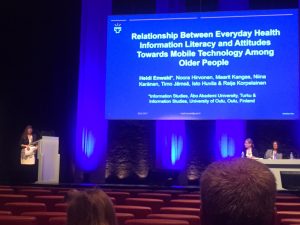 Isto, Noora and Heidi from HIBA project participated in the 5th European Conference in Information Literacy in Saint-Malo, France. All were a part of the Health Information Literacy Special Session organised by Anne-Kathrin Mayer (ZIPD, Leibniz Institute for Psychology Information) and Maija-Leena Huotari (University of Oulu).
Isto, Noora and Heidi from HIBA project participated in the 5th European Conference in Information Literacy in Saint-Malo, France. All were a part of the Health Information Literacy Special Session organised by Anne-Kathrin Mayer (ZIPD, Leibniz Institute for Psychology Information) and Maija-Leena Huotari (University of Oulu).
In the session, Veronika Kuhberg-Lasson (ZIPD) discussed the health information literacy knowledge (HILK) of students from vocational schools in Germany. According to the study, lower education lead to lower HILK with no significant differences between vocations. However, when tested for personality differences, the authors suggested that instead of the level of education, the use of untrustworthy information sources might be related to higher levels of extraversion.
Heidi presented a paper on the Relationship between Everyday Health Information Literacy and Attitudes towards Mobile Technology among Older People, a cooperation between researchers participating in the HIBA project, Oulu Deaconess Institute and the University of Oulu. The study investigated how everyday health information literacy (EHIL) was related to the use of traditional and advanced mobile information technologies, and how older adults felt about the use of advanced mobile technologies (i.e. smart phones, tablet computers). Regarding their EHIL, only 28% felt that it is easy to access reliable health information from the Internet. A minority had used advanced mobile information technologies, but the attitudes in the group of respondents were generally rather positive. The findings showed that confidence and positive opinions on EHIL had more positive opinions on mobile information technology. The study suggests that older adults with different levels of EHIL should be engaged in the development of new mobile information technologies.
Noora presented a paper related to EHIL together with Teija Keränen and Maija-Leena Huotari titled Examining the Applicability of the Everyday Health Information Literacy Screening Tool in the Context of Energy. In the study, The factorial structure of the EHIL screening tool modified for energy information was similar to the original tool. The tool can be used to find individuals who lack motivation or have difficulties in finding or evaluating information.
Anna-Maija Huhta (University of Oulu), who has previously worked in HIBA project, presented a co-authored paper Concepts Related to Health Literacy in Online Information Environments: A Systematic Review. Huhta and her colleagues had conducted a review of how information is approached in various health related literacy concepts. Majority of the analysed texts were written in medical and health sciences. The most common concepts were health literacy, ehealth literacy, health information literacy, and (everyday) health information literacy. Similar to all definitions was that all focussed on the ability to understand, comprehend and use information but also to use information as a tool. Differences related to the role of prior knowledge, information needs, critical evaluation of information and types of information considered.
Sigríður Björk Einarsdóttir and Ágústa Pálsdóttir had investigated the health information literacy of parents of children with a disability or long-term illness using qualitative interview study. The authors conclusion was that information seeking takes time and especially with information that should be easily available, takes time and effort.
Finally, Anne-Kathrin Mayer (presented by Veronika Kuhberg-Lasson) investigated the different approaches to measuring information literacy skills. The authors had found discrepancies between objective and subjective measures, and suggested further research on their causes and relations to other factors.
As a whole, the presentations show that it is not uncomplicated to measure and study health information literacy and to say what should be measured and how. Appropriate practices, confidence and good outcomes depend on multiple factors — as their lack of. At the same time, it seems that it is possible to develop scales that can be useful as proxies of certain constellations of practices to understand better how people interact with health information.
2017-09-20 at 2 58 pm: Sheila Webber live blogged the session at http://information-literacy.blogspot.se/2017/09/health-information-literacy-session-pam.html
